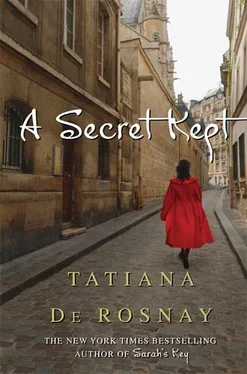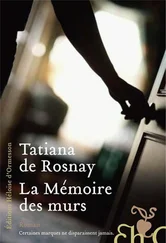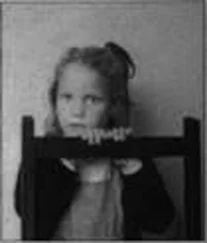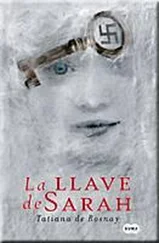The place where we are standing is cool, quiet, a little corridor off the waiting room.
“Have you checked on your sister yet?” she asks.
“I just arrived. She is with the nurses. I’m going back there now.”
“Okay. Give me a couple of hours. I should be done by then.”
She kisses me on the mouth, a warm, wet kiss. I make my way back up to Mélanie’s ward. The hospital seems fuller, busier than usual. My sister’s face is less pale, almost pink. Her eyes light up when she sees me.
“I can’t wait to get out of here,” she whispers. “They’re all very nice, but I just want to go home.”
“What is Dr. Besson saying?”
“She says it could be quite soon.”
She asks how my week was. I grin, not quite knowing how to begin. A wretched week, in every way. Tiresome paperwork for the car insurance. Another argument with Rabagny about the day-care center. More exasperation with Florence. Our father and his aging, tired face, his short temper. A difficult weekend with the kids. School had just started and everyone was tense. Never had I felt more relieved to drop them off at Malakoff. I just tell Mélanie it was one of those crappy weeks where everything goes wrong.
I sit with her for a while. We talk about the letters she has been getting, flowers, phone calls. The old beau has sent a ruby ring from a place Vendôme jeweler. Sometimes I think she is going to talk about the crash, but she doesn’t. Nothing is coming back to her yet. I need to be patient.
“I can’t wait for fall, for winter.” Mélanie sighs. “I hate the end of summer. I hate the heat, I hate everything about it. I can’t wait for chilly winter mornings and hot-water bottles.”
Dr. Besson comes in, shakes my hand. She tells us that Mélanie can be driven back to Paris by ambulance within the next weeks, probably after the middle of September. She will be allowed to convalesce in her own home for at least two months, under the care of a physiotherapist and with regular visits to her doctor.
“Your sister has been very brave,” she says later, as we fill out paperwork in her office. She hands me a stack of social security papers and insurance forms. Then she looks right at me. “How is your father?”
“You think he’s ill, don’t you?”
She nods.
I say, “He hasn’t told me or my sister what’s wrong with him. I notice how tired he is, but that’s all I can tell you.”
“What about your mother?” she asks. “Does she know something?”
“Our mother died when we were young.”
“Oh, I’m sorry,” she says quickly.
“Our father is remarried. But I’m not sure what my stepmother can tell me about his health. We aren’t very close.”
She nods. Pauses awhile. Then says, “I just want to make sure he’s under medical supervision.”
“Why are you worried?”
She looks at me. Shrewd hazel irises. “I just want to make sure.”
“Do you want me to talk to him?”
“Yes,” she says. “Just ask him if he’s been seeing his doctor.”
“All right,” I say. “I will.”
As I make my way back to Angèle’s office, I wonder what it was about my father that Dr. Besson noticed. What did her expert medical eye see that I didn’t? I feel annoyed, concerned. I haven’t seen my father since my last visit. Nor have I spoken to him. But I have dreamed of him in the past few weeks, as I have dreamed of my mother. Noirmoutier coming back to me, like the tide rising over the Gois passage and the gulls circling over the rescue poles. Dreams of my father, my mother, when they were young, on the beach. My mother’s smile, my father’s laugh. Dreams of my recent stay with Mélanie. The night of her birthday, how beautiful she looked in her black dress. The elegant couple next to us, raising their glasses of champagne in our direction. The chef exclaiming, “Madame Rey!” Room number 9. My mother’s room. Since the night of the accident, I have dreamed of Noirmoutier again and again. Noirmoutier has never left me.

Hospital morgue, reads the sign. I knock once, then twice. No answer. I stand outside Angèle’s door for a long time. I guess she isn’t done yet. I go and sit in the small waiting room reserved for the bereaved. It is empty right now, and I feel relieved that I’m the only one there. Time creeps by. I check my phone. No missed calls. No voice messages. No texts.
A small noise makes me look up. A person wearing goggles, a mask, a paper skullcap, latex gloves, and light blue overalls tucked into rubber boots is standing in front of me. I rush to my feet. A gloved hand takes off the goggles and the mask. Angèle’s beautiful, chiseled features appear.
“Hell of a day,” she says. “Sorry I kept you waiting.”
She looks tired, her face drawn.
Behind her, the door to her offices is partially open. I glance into the space I can see from here. A small blue room. Completely bare. Linoleum. Beyond that, another door, open as well. White walls, white tiled floors. Gurneys. Vials and various tools I can’t make out. A strange, powerful smell floats in the air. She smells of it too. I can pick it up on her overalls. Is it the smell of death? Of formaldehyde? All I know is that this is the first time I ever smell it and the first time I smell it on her.
“Are you afraid?” she asks gently.
“No,” I say.
“Do you want to go in?”
I don’t hesitate. “Yes, I do.”
She takes off her gloves, and the warm flesh of her hand meets mine.
“Come into Morticia’s lair,” she whispers. She closes the heavy door behind her. We are standing in the first room. “This is where the bodies are wheeled in so that their families can see them for the last time. The viewing room.”
I try to imagine what goes on here. Was it in a place like this that Mélanie and I were shown our mother’s body? It must have been. Something in my mind goes blank, and I can’t imagine or remember anything. If I had seen her in death all those years ago, if I hadn’t closed my eyes, it would have been in a room like this one. I follow Angèle into the larger room beyond. The odor here is stronger, almost overpowering. Like sulfur. There is a body covered with a white hospital sheet, on a gurney. The place is very clean. Pristine surfaces. Shining instruments. No stains. Light pouring through the blinds. I can hear the hum of air-conditioning. It is cooler in here, cooler than anywhere else in the hospital.
“What do you want to know?” Angèle says.
“What you can tell me.”
She smiles. “Let me introduce you to this afternoon’s patient.”
She gently moves the sheet back from the form on the gurney. I feel myself stiffening, as I had all those years ago when the sheet was removed from my mother’s body, but the face that appears is a peaceful, tranquil one. An old man with a bushy white beard. He is wearing a gray suit, a white shirt, a navy blue tie, and patent leather shoes. His hands are crossed on his chest.
“Come closer,” she says. “He won’t bite.”
He looks asleep, but as I come near, I can see the utter stillness of death.
“This is Monsieur B. He had a heart attack. He was eighty-five.”
“Did he come in looking this good?”
“When he came in, he was wearing stained pajamas, his face was crumpled up, and he was bright purple.”
I flinch.
“I start by washing my patients. I take my time. I wash them from head to toe. I use this special hose here.” She points to a nearby sink and faucet. “I use a sponge and detergent. While I do this, I bend and flex arms and legs, so that rigor mortis doesn’t set in too fast. I close the eyes with special little caps, and I suture the mouth, but I hate that word, so I’d rather say I close the mouth, and sometimes I use an adhesive because it looks more natural. I hate those small-stitched mouths some morticians make. If there has been trauma to the face or body, I work on those areas with wax or other methods. Sometimes that takes a while. Then I start the embalming process. Do you know what that is?”
Читать дальше












